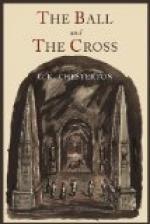Half an hour afterwards his emotions left him with an emptied mind on the same spot. And it was in a mood of mere idle investigation that he happened to come to a standstill opposite the office of The Atheist. He did not see the word “atheist”, or if he did, it is quite possible that he did not know the meaning of the word. Even as it was, the document would not have shocked even the innocent Highlander, but for the troublesome and quite unforeseen fact that the innocent Highlander read it stolidly to the end; a thing unknown among the most enthusiastic subscribers to the paper, and calculated in any case to create a new situation.
With a smart journalistic instinct characteristic of all his school, the editor of The Atheist had put first in his paper and most prominently in his window an article called “The Mesopotamian Mythology and its Effects on Syriac Folk Lore.” Mr. Evan MacIan began to read this quite idly, as he would have read a public statement beginning with a young girl dying in Brighton and ending with Bile Beans. He received the very considerable amount of information accumulated by the author with that tired clearness of the mind which children have on heavy summer afternoons—that tired clearness which leads them to go on asking questions long after they have lost interest in the subject and are as bored as their nurse. The streets were full of people and empty of adventures. He might as well know about the gods of Mesopotamia as not; so he flattened his long, lean face against the dim bleak pane of the window and read all there was to read about Mesopotamian gods. He read how the Mesopotamians had a god named Sho (sometimes pronounced Ji), and that he was described as being very powerful, a striking similarity to some expressions about Jahveh, who is also described as having power. Evan had never heard of Jahveh in his life, and imagining him to be some other Mesopotamian idol, read on with a dull curiosity. He learnt that the name Sho, under its third form of Psa, occurs in an early legend which describes how the deity, after the manner of Jupiter on so many occasions, seduced a Virgin and begat a hero. This hero, whose name is not essential to our existence, was, it was said, the chief hero and Saviour of the Mesopotamian ethical scheme. Then followed a paragraph giving other examples of such heroes and Saviours being born of some profligate intercourse between God and mortal. Then followed a paragraph—but Evan did not understand it. He read it again and then again. Then he did understand it. The glass fell in ringing fragments on to the pavement, and Evan sprang over the barrier into the shop, brandishing his stick.
“What is this?” cried little Mr. Turnbull, starting up with hair aflame. “How dare you break my window?”
“Because it was the quickest cut to you,” cried Evan, stamping. “Stand up and fight, you crapulous coward. You dirty lunatic, stand up, will you? Have you any weapons here?”




